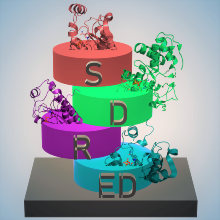The Short-chain Dehydrogenases/Reductases Engineering Database (SDRED) covers one of the largest known protein families (168 150 proteins).
Assignment to the superfamilies of Classical and Extended SDRs was achieved by global sequence similarity and by identification of family-specific sequence motifs. Two standard numbering schemes were established for Classical and Extended SDRs that allow for the determination of conserved amino acid residues, such as cofactor specificity determining positions or superfamily specific sequence motifs. The comprehensive sequence dataset of the SDRED facilitates the refinement of family-specific sequence motifs. The glycine-rich motifs for Classical and Extended SDRs were refined to improve the precision of superfamily classification. In each superfamily, the majority of sequences formed a tightly connected sequence network and belonged to a large homologous family. Despite their different sequence motifs and their different sequence length, the two sequence networks of Classical and Extended SDRs are not separate, but connected by edges at a threshold of 40% sequence similarity, indicating that all SDRs belong to a large, connected network. The SDRED is accessible at https://sdred.biocatnet.de/.
The Short-chain Dehydrogenase/Reductase Engineering Database (SDRED):
A classification and analysis system for a highly diverse enzyme family.
Proteins 2019; 87: 443-451


